Books
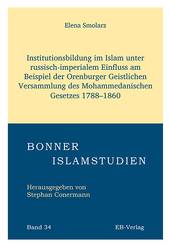
Smolarz, Elena (2016): Institutionsbildung im Islam unter russisch-imperialem Einfluss am Beispiel der Orenburger Geistlichen Versammlung des Mohammedanischen Gesetzes 1788–1860. Berlin: EB Verlag.
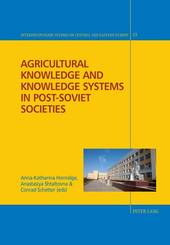
Hornidge, Anna-Katharina, Anastasiya Shtaltovna & Conrad Schetter(Eds.,2016): Agricultural Knowledge and Knowledge Systems in Post-Soviet Societies. Bern: Peter Lang.
This volume addresses the crucial role of knowledge and innovation in coping with and adapting to socio-economic and political transformation processes in post-Soviet societies. Unique are the bottom up or micro-sociological and ethnographic perspectives offered by the book on the processes of post-Soviet transformations in Central Asia and the Southern Caucasus. Three thematic fields form the structuring frame: cultures of knowledge production and sharing in agriculture; local governance arrangements and knowledge production; and finally, the present situation of agricultural advisory services development.
- Anna-Katharina Hornidge, Anastasiya Shtaltovna and Conrad Schetter: Independence, Transformation and the Search for a Future in Agriculture
- Kristof Van Assche, Anna-Katharina Hornidge, Anastasiya Shtaltovna and Hafiz Boboyorov: Epistemic Cultures in Transition: Agricultural Expertise Development in Tajikistan, Uzbekistan and Georgia
- Jeanne Féaux de la Croix: Foot Soldiers of Development? The Role of Kyrgyzstani Treneri in Agricultural Knowledge Transfer
- Lena Fey: Which Knowledge, Which Agriculture? Local Farmers and Agricultural Development in Georgia
- Anja Katharina Salzer: Knowledge for Sustainability – Cultural Capital of Ethnic Minorities in High Mountain Areas of the South Caucasus
- Filippo de Danieli and Anastasiya Shtaltovna: Competition Within the State, With the State and Beyond the State: Agricultural Extension in Tajikistan and the Struggles of Market Formation
- Tim Röing: Creating Business Mentalities: Knowledge and Rural Development in Georgia from a Discursive Perspective
- Irna Hofman: More Foreign than Other Foreigners: On Discourse and Adoption – The Contradiction of Astonishment and Fear for Chinese Farm Practices in Tajikistan
- Kristof Van Assche, Anastasiya Shtaltovna and Anna-Katharina Hornidge: Local Knowledge and Expert Knowledge in Rural Transition: Georgian Wine Production
- Nodir Djanibekov: Agricultural Organization and the Role of Contractual Structures in Knowledge Flows in Post-Soviet Uzbekistan
- Makhmud Shaumarov and Regina Birner: Scientific Knowledge of Dryland Pastoral System Development in Uzbekistan
- Hafiz Boboyorov: Constraints and Concerns for Farming and Cropping Types and Strategies in Southern Tajikistan
- Andreas Mandler: Investments in Agriculture in Northern Tajikistan: Considering the Dehqon Farm
- Wibke Crewett: “There is a New Law?” Experiences from the Implementation of a Pasture Governance Reform in Kyrgyzstan
- Kristof Van Assche: Afterword: Expertise and Rural Development after the Soviets
Find the full table of contents here: Content
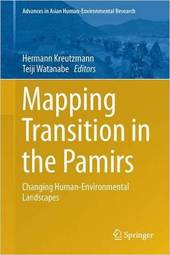
Kreutzmann, Hermann & Teiji Watanabe (Eds., 2016): Mapping transition in the Pamirs. With case studies on the changing human-environmental landscapes. Cham: Springer.
By emphasizing on the Pamir region a comprehensive overview of path-dependent and recent developments in a remote mountain region is provided in this book. Overall neglect in the mountainous periphery is contrasted by shifting the centre of attention to the Pamirs situated at the interface between South and Central Asia. From colonial times to now there has been a debate on grasping and locating the area. Here field-work based contributions are collected to provide a variety of perspectives on the Pamirs highlighting transformation and transition in Post-Soviet societies as well as in Afghanistan and Pakistan. The similar ecological environment across borders features the common ground while analyzing development processes in a set of case studies that aim at highlighting certain aspects of regional development.
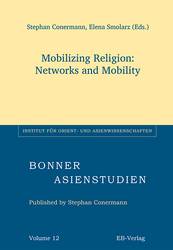
Conermann, Stephan & Elena Smolarz (Eds., 2015): Mobilizing Religion: Networks and Mobility. Bonner Asienstudien 12. Berlin: EBV.
Religion is known to be an important identity marker for social orders and potential power relations. The religious factor contributes to the definition of the self and the other. On the one hand, the religious component as legitimising social construct constitutes the establishment of certain social and cultural spheres and their boundaries. On the other hand, it operates as a connecting element across geographical, ethnic, social or political boundaries. Religious concepts offer the basis for legitimation of demands. Religious ties connect individuals to confessional or religious networks and postulate shared identity and belonging. Religious dogmas and norms constitute individual as well as collective orientations, codes of conduct and behavioral practices and interdependences between social and religious processes. This edited volume draws attention to religious aspects in modern, historical, political and social processes: spatial and social mobility, establishment of networked and globalized traditions as well as social development. What religious aspects might influence these processes and how? Scholars of Area Studies (Islamic Studies, Near and Middle Eastern Studies, Mongolian Studies, Central Asian Studies) as well as of Development Studies, Social and Cultural Anthropology, Political Studies and Studies of Comparative Religion discuss the role religion plays in these processes.
The book features contributions from network members Andreas Benz, Anna Grieser, Martin Sökefeld, Andreas Mandler and Shahnaz Nadjmabadi.
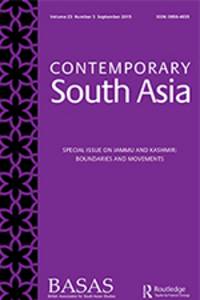
Sökefeld, Martin (Eds., 2016): Jammu and Kashmir – Boundaries and Movements. Special Issue of Contemporary South Asia: Taylor and Francis Online
Table of Contents (Articles):
- Sökefeld, M.: Introduction. Jammu and Kashmir – boundaries and movements, 251-265.
- Zutshi, C.: An ongoing partition: histories, borders, and the politics of vivisection in Jammu and Kashmir, 266-275.
- Kreutzmann, H.: Boundaries and space in Gilgit-Baltistan, 276-291.
- Schild, P.: Local politics of reconstruction along and across Azad Kashmir’s border with Pakistan, 292-313.
- Loureiro, M.: The boundary within: equality, hierarchy, and exclusion in Azad Jammu and Kashmir, 314-333.
- Khalil Khan, S.: Discerning women’s discursive frames in CyberKashmir, 334-351.
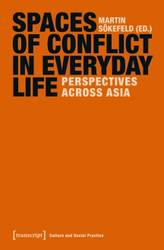
Sökefeld, Martin (Ed., 2015): Spaces of Conflict in Everyday Life: Perspectives across Asia. Bielefeld: transcript Verlag.
This volume presents contributions made to the conference "Spaces of conflict in everyday life. Figurations and Methodology" hosted and run by Crossroads Asia in Munich in October 2014.
Conflicts are everyday situations and experiences with which people have to cope. Focusing on particularly conflict-prone parts of Asia, the contributions to this book analyze the dynamics of conflicts from the perspectives of the actors involved, and pay particular attention to aspects like mobilization, exclusion, segregation, the role of institutions and the construction of antagonistic identities. The book gathers case studies based on long-term fieldwork from conflicts in Kyrgyzstan, Afghanistan, Pakistan, and Kashmir.
Apart from the editor, Martin Sökefeld, network members Katja Mielke and Aksana Ismailbekova are featured.
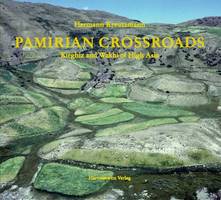
Kreutzmann, Hermann (2015): Pamirian Crossroads: Kirghiz and Wakhi of High Asia. Wiesbaden: Harrassowitz Verlag.
The Pamirian Knot was a focal region during the ‘Great Game’ in High Asia. In the aftermath the mountainous borderland regions became peripheries in their respective countries. Pamirian Crossroads highlights these marginal borderlands in four neighbouring countries – Afghanistan, Pakistan, China and Tajikistan – and analyses the differentiating effects of imperial designs, colonial boundary-making, political intervention and administrative reforms on people living in a mountain environment. The material presented was collected during a fieldwork period spanning more than three decades, accompanied by archival research and the collection of historical illustra-tions along the Pamirian Crossroads and beyond.
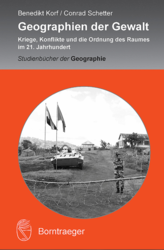
Korf, Benedikt & Conrad Schetter (2015): Geographien der Gewalt. Kriege, Konflikte und die Ordnung des Raumes im 21. Jahrhundert. At: Borntraeger Verlag/ Schweizerbart Science Publishers.
Bürgerkriege, Terrorismus und organisierte Kriminalität stellen das herrschende Ordnungsparadigma der Nationalstaaten in vielen Regionen der Erde zunehmend in Frage. Dies führt zu gegenläufigen Prozessen der Territorialisierung und Deterritorialisierung, die sich in “Geographien der Gewalt“ niederschlagen. Die Beiträge in diesem Band beschreiben unterschiedliche Ausprägungen und Formen organisierter Gewalt und ihre Einbettung in soziale, politische und räumliche (Um-)Ordnungsprozesse. Divergierende Konflikttypen und die damit verbundene Strukturdynamik der Gewalt werden anhand von Beispielen aus Afghanistan, Pakistan, Äthiopien, Somalia, Nepal, Sri Lanka, Brasilien, dem Kongo und dem Libanon erläutert. Zudem wird die Rolle globaler Schaltstellen der Macht in virtuellen Konflikträumen analysiert.
Dieser Band richtet sich an Studierende, Lehrende und Forschende der Geographie, der Politik- und Sozialwissenschaften und der Ethnologie, wendet sich aber auch an Schlüsselpersonen in Politik und Gesellschaft, die sich mit den räumlichen Ausprägungen von Gewalt beschäftigen.
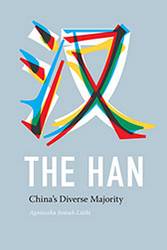
Joniak-Lüthi, Agnieszka (2015): The Han: China’s Diverse Majority. At: University of Washington Press.
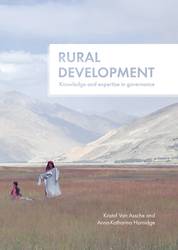
von Assche, Kristof & Anna-Katharina Hornidge (2014): Rural Development. Knowledge and Expertise in Governance. Book can be ordered at Wageningen Academic Publishers.
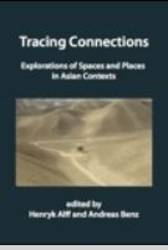
Alff, Henryk & Andreas Benz (eds.) (2014): Tracing Connections – Explorations of Spaces and Places in Asian Contexts. WVB
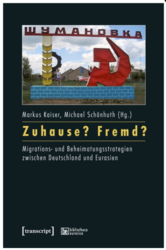
Kaiser, Markus & Schönhut, Michael (2014): Zuhause? Fremd? Migrations- und Beheimatungsstrategien zwischen Deutschland und Eurasien. Published on transcipt Verlag.
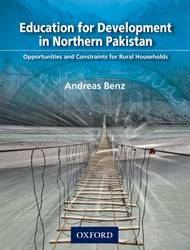
Benz, Andreas 2014: Education for Development in Northern Pakistan: Opportunities and Constraints for Rural Households. Oxford University Press.
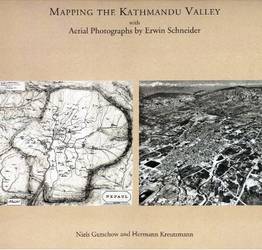
Gutschow, Niels & Hermann Kreutzmann 2013: Mapping the Kathmandu Valley with Aerial Photographs by Erwin Schneider. Himal Books
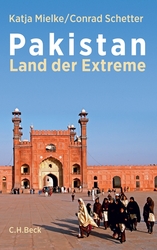
Mielke, Katja & Conrad Schetter 2013: Pakistan: Land der Extreme. Geschichte, Politik und Kultur. C.H. Beck.
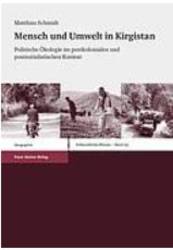
Schmidt, Matthias 2013: Mensch und Umwelt in Kirgistan – Politische Ökologie im postkolonialen und postsozialistischen Kontext. Reihe Erdkundliches Wissen. Franz Steiner Verlag.
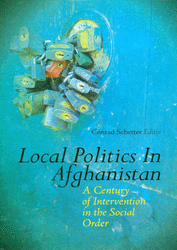
Schetter, Conrad (ed.) 2013: Local Politics in Afghanistan. A Century of Intervention in the Social Order. Hurst & Company.
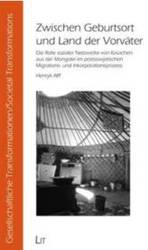
Alff, Henryk 2012: Zwischen Geburtsort und Land der Vorväter. Die Rolle sozialer Netzwerke von Kasachen aus der Mongolei im postsowjetischen Migrations-und Inkorporationsprozess. LIT.

Conermann, Stephan (ed.) 2012: Was ist Kulturwissenschaft? Zehn antworten aus den "Kleinen Fächern". transcript.
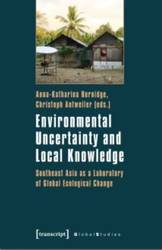
Hornidge, Anna-Katharina & Christoph Antweiler(Hrsg.) 2012: Environmental Uncertainty and Local Knowledge. Southeast Asia as a Laboratory of Global Ecological Change. Transcript.
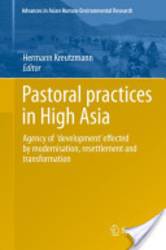
Kreutzmann, Hermann (ed.) 2012: Pastoral practices in High Asia. Agency of 'Development' Effected by Modernisation, Resettlement and Transformation. SpringerLink
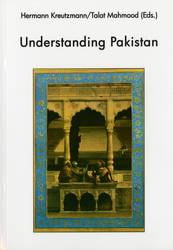
Kreutzmann, Hermann & Talat Mahmood (eds.) 2012: Understanding Pakistan. Wissenschaftlicher Verlag Berlin.
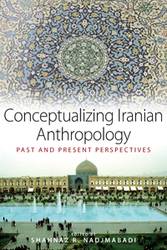
Nadjmabadi, Shahnaz (ed.) 2012: Conceptualizing Iranian Anthropology. Past and Present Perspectives. Berghahn Books.
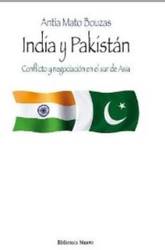
Mato Bouzas, Antía (2011): India y Pakistán: Conflicto y Negociación en el Sur de Asia. Biblioteca Nueva.
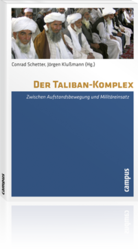
Schetter, Conrad & Klussmann, Jörgen (eds.) 2011: Der Taliban-Komplex: Zwischen Aufstandsbewegung und Militäreinsatz. Campus Verlag.







